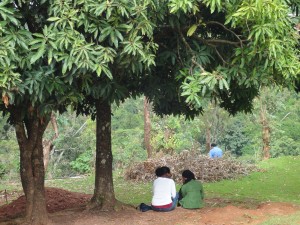On a recent work trip to Ethiopia, I led and facilitated a group of 15 researchers collecting stories about adolescent girls for Girl Effect with SART, an Ethiopian Research company. We followed a BBC crew showing a documentary about stories of Ethiopian girls.
I used participatory leadership practices to build the team’s spirit and commitment to their work. For the team to take ownership of the process, they needed to understand the importance of women’s experiences. What better way for this to occur than on our own team? But in the meetings, the women were quiet.

A researcher collects a young storyteller’s story
1 / 4
StartStop




During the first two days of working together, I was frustrated. Everything I learned about facilitation was not working. One-on-one informal conversations flowed, but once the team was in a meeting, my opening question would be met with silence. “What are you learning about this community?” “What would you like to share about your experience today?” “Did anything stand out?” On the third day, the coordinator approached me and said: “Dr. Rita, the questions you ask, they’re too ….they’re too hard to answer. That’s why we’re quiet. We’re Ethiopian. We don’t like to break the ice. We prefer silence.”
I asked him to guide me in ways to overcome these challenges, and I learned to begin with more concrete questions (“Who facilitated groups today?” “Were young girls more responsive in smaller groups?” “Were girls looking for validation from facilitators?”). I also asked team members to respond to a question by going around in a circle, which made it easier for people to speak up, as their turn was designated and expected.
This worked well in debriefing the research process, but didn’t address team members’ emotional needs. Though the project was short, the two weeks of data collection were very intense ones for the researchers; the more they collected stories, the more stories of physical violence against children, rape, hunger, and tremendous poverty emerged. I could see the team becoming sad, worn out, and overwhelmed. I could sense the team spirit wavering.
I wanted to offer my support, yet, as a western researcher, it was unlikely that they would come to me. A strong sense of reserve and dignity kept team members from sharing their challenges. Still, I continued to hold space for the hard conversations in our meetings. At each meeting, I asked if there was discomfort, and I renewed my availability for anyone who needed me. “Are there any stories that were hard to hear?” “How do you feel collecting these stories?” All questions were met with silence, yet I was no longer worried. I could sense that spirits were not as heavy. Just by having the option to talk, members were lightening up.
Later, I asked the coordinator if team members ever talked about their experiences AFTER our meetings: “Yes, last night we did, and for quite a while.” “Good,” I said, “I don’t have to hear the conversation. I just want it to take place. As long as you go to each other about how this work makes you feel so you don’t burn out.”
I was happy hosting the silence that generated later conversations. I didn’t need to hear the whole conversation. Sometimes all a facilitator can do is host the silence that plants the seed for conversations to grow in better-suited contexts. English was not my researchers’ first language, and I was not a person from their culture. If the conversation didn’t take place in my presence it didn’t matter.

